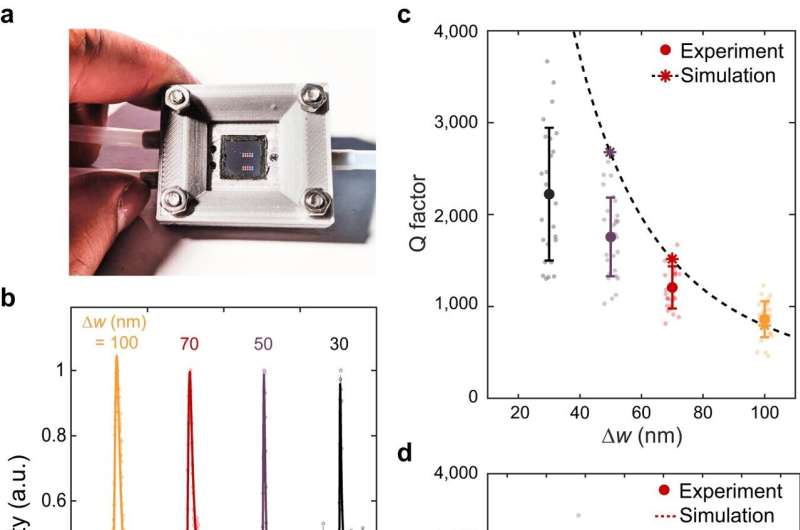
A team of materials scientists and engineers at Stanford University, working with a colleague from ETH Zürich and another from Washington University in St. Louis, has developed a biochip that can be used to screen thousands of molecules and that was successfully tested with a live virus. Their paper is published in the journal Nature Communications.
Using genetic analysis methods to test molecules has become an important part of research and diagnostic applications. But as the researchers with this new effort note, current approaches using nucleic acid technology rely on amplification of samples which can lead to inhibition. In the new study, the research team took a new approach—they built a biochip with tiny silicon boxes that can each be used to screen molecules. Such an approach allows for detecting up to 160,000 molecules on a single chip just 1 cm2 in size.
The biochip was built by creating multiple silicon boxes that sit on the surface of the chip situated in arrays. Each of the arrays measures just 160 nanometers wide, 600 nanometers long and 500 nanometers high. The boxes were made in such a way as to focus near-infrared light fired from below on their top surfaces—this was achieved by adding nanoantennas. Thus, the boxes were able to exert control over far-field scattering, which allowed for measuring shifts in wavelengths of light as they emerged from a given box, revealing the structure of a molecule.
To test their biochip, the research team applied 22 single-stranded gene bits to the boxes and then submerged them in a buffer solution—the solution was used to join complementary DNA strands with tethered ones, causing a shift in the wavelength of the light emitted from each box. The team found the chip capable of identifying 4,000 copies of target genes per microliter of buffer solution.
The researchers suggest their biochip could be used as both a diagnostic tool and as a research aid. To further prove its utility, they used it to detect SARS-COV-2 gene fragments.
More information:
Jack Hu et al, Rapid genetic screening with high quality factor metasurfaces, Nature Communications (2023). DOI: 10.1038/s41467-023-39721-w
© 2023 Science X Network
Citation:
A biochip that can be used to perform rapid genetic screening of thousands of molecules (2023, August 8)
retrieved 8 August 2023
from https://phys.org/news/2023-08-biochip-rapid-genetic-screening-thousands.html
This document is subject to copyright. Apart from any fair dealing for the purpose of private study or research, no
part may be reproduced without the written permission. The content is provided for information purposes only.









